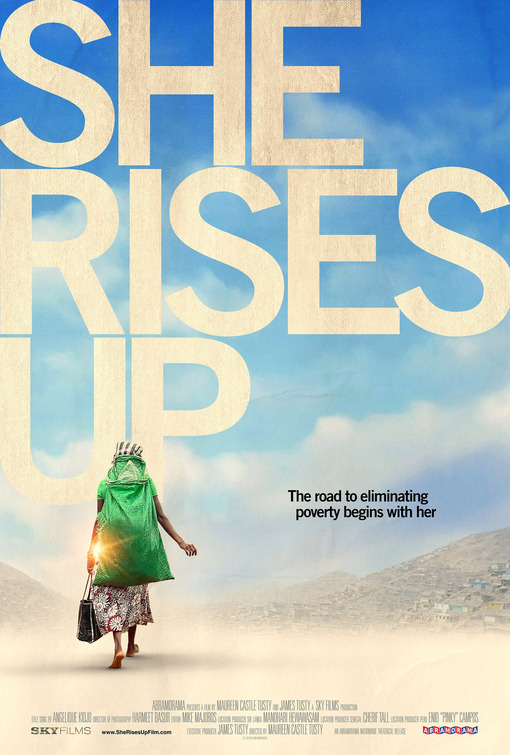Documentary filmmaker Maureen Castle Tusty’s newest film, “She Rises Up,” is a dossier about the international economy and a trio of women trying to carve their space within it. Focusing on the stories of Magatte from Senegal, Gladys from Peru, and Selyna from Sri Lanka, “She Rises Up,” allows these women to discuss the relationship between female economic oppression and their communities’ financial instability. Looking to empower their countries, each of their entrepreneurial efforts is equally centered on making work accessible for women.
A slide in the film’s introduction dictates that if women contributed to the international economy to the same degree as men, they would have an equal global impact as the economies of the United States and China. The film takes this opening statement and pursues a path to prove it, spotlighting each of the women whilst also dissecting their various barriers to entry.
Selyna focuses on the textile industry and export of fabrics, but as business director, she’s more of a tour guide than a true subject. Better, we get to know mother and daughter duo Nirmala and Madhusha, who lament how the lack of sexual health education impacts their financial lives. “Period poverty” is a struggle felt by many, as accessibility to products is challenged, shame influences their ability to advocate, and the monthly financial burden of feminine care leaves many without. For this reason, they started their own production of reusable pads with Sri Lankan textiles, putting both money and feminine resources into the pockets of the women in their community.
In Peru, Gladys owns and operates two convenience stores, where she is able to employ her family as well. Noting that she came from an unfortunately familiar home life with an absent father, that she wanted to build an independent future for herself and set the example for her daughter as well. And Magatte from Senegal saw local markets, one of the few places where women were allowed to make money, become trampled by the capitalist influence of big brand sodas that put independent, local hibiscus drinks out of business. In an effort not only to sustain the employment of the women at the markets, but also preserve the culture via their local beverages, she started a business to bottle and sell the beverage. And yet, eventually was forced to pivot as her business partners moved to outsource the drink’s production to China.
“She Rises Up” makes an effort to cherish each culture on display as the women elaborate on their strategies and varying hurdles, but it does so with very little engagement. While we understand the impassioned drive of the women as well as the institutional stonewalling that keeps them, and ultimately the nation, stagnant, “She Rises Up” fails to appeal to the emotional impact of these consequences. It’s painfully straightforward, stuck in a format of revealing motivations and personal stories and then throwing down the various ways in which the government is institutionally resistant. We don’t get to sit with the humanity.
The film as a whole feels much like a school presentation, a slideshow of ideas and overly saccharine treatment of plights and problems that is so blatantly displayed that it doesn’t really land. It’s clear, both in form and execution, that the film’s number one priority is education, but the lack of finesse is unlikely to make the information stick. The editing is scant, with long takes of talking heads while the women chat in circles around their points. The structure is a mixed bag, with jumps to and from Peru, Senegal, and Sri Lanka, that are more hopscotchy than smooth.
What persists most is Magatte’s declaration and call to action: “To have a heart for the poor is easy; to have a mind for the poor is the challenge.” Nearly a third of the world’s nations have laws that bar women from employment, and many of them are some of the poorest countries in the world. This idea of shopping local takes new meaning and adheres to the heartstrings as the credits begin, but much of the detail fails to make an impact, and “She Rises Up” becomes largely forgettable.




















